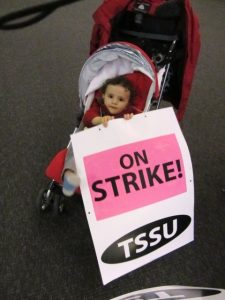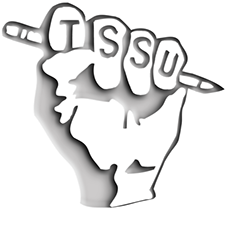Contract Wins: The Story of the TSSU Childcare Fund


Today’s topic is an important one for many of the TSSU’s members: childcare support. Many of the TSSU’s members also have families, and the TSSU has bargained for a specific fund set up to help mitigate the cost of childcare for its members which was funded by a forgone wage increase. This fund is available for all members with children under the age of 13, with a tiered system which disperses a set rate to members each semester based on their child’s age and whether they are currently employed in a TSSU position. The application for this fund is easily accessible on the TSSU’s website, and only takes a few minutes to complete.
But it wasn’t always this way- prior to the last round of bargaining, the TSSU childcare fund was actually administered solely by SFU administration. To fully appreciate how much this fund has changed, I talked to David Newman, a Lecturer in the School of Communication at SFU who has had a long-standing involvement with the TSSU Childcare Fund. David and his family came to Canada in the early 2000’s and applied for aid from the childcare fund, as his son was 3 at the time. Over the years, David consistently found that the childcare fund was difficult to deal with, from applying for the fund to actually receiving the money. Each semester, David, along with other families seeking childcare support, would complete the same large amount of paperwork to apply for the bursary, and have to wait until the end of the semester to find out how much support (if any) they would receive. It was normal at the time for a number of families to appeal the decisions made by the SFU administrators, as they often found they had not been given the appropriate amount of funds or that they were wrongfully denied funds. In these times, an average of 5 bursaries was awarded each semester.
Aside from being inaccessible to those applying for it, the fund was also operated under a number of assumptions that exacerbated these problems. Only students were eligible to even apply for the fund, despite the fact that many of the TSSU’s members are not students. In addition to this, the fund was based on a needs-based system which prioritized the needs of a single student- so many families who had some assets (such as a car, or owning a home, or some savings from working before coming back to graduate school) were automatically considered to not need childcare assistance.
David put up with this system on his own for years, and the TSSU eventually began to become involved with the end-of-semester appeals around 2010. Before bargaining for the 2014-2019 Collective Agreement had even begun, the TSSU was already taking measures to try and solve the issues with the TSSU childcare fund- a joint committee of TSSU members and SFU administration was created in order to discuss their options. David was on this committee and saw-first hand some of the obstacles that had to be overcome in order to fix the problems that he and other families were facing. One of the main issues was that SFU categorized the fund as a bursary, which is defined as a grant for students only, while TSSU argued that the purpose of the fund was to make childcare accessible to all members. Another issue that arose was that in order to fix the fund, SFU administration suggested shifting all responsibility for the fund to the TSSU, which logistically would not have been feasible for the TSSU at the time. This lead to a sort of stalemate, which prevented any progress from being made towards a solution for fixing the fund.
A turning point in negotiations came in 2013, when David discovered that SFU already had a bursary (the Emily Campbell Childcare Bursary), which is specifically geared at providing childcare for SFU staff (not students). The TSSU saw this as an opportunity to make a case for making the fund accessible to its sessional and ELC/ITP members as well as students. Ultimately, the momentum from this discovery carried on into the bargaining for the 2014 Collective Agreement, and lead to the point where the SFU administration was finally willing to make some changes to the childcare fund., bringing us to the version of the childcare fund that is used today. As an added bonus to this victory, in 2016, the TSSU also won a $300,000 settlement to put back into the childcare fund to make up for the improper use of the fund to subsidize other bursaries by SFU administration.
The current childcare fund is easier to apply for, makes funding accessible to all TSSU members, and ensures a consistent amount of money is given to families each semester. In the past 7 semesters, the TSSU has distributed $550,000 to over 250 members, with an average of 88 bursaries being awarded each semester. This is a stark contrast to the number of members who were given bursaries prior to the TSSU’s involvement!
While David and I both agree that the current use of the childcare fund is a significant improvement from what it was previously, I asked David if he thought there were still improvements to be made to the TSSU childcare fund. Although the present operation of the fund was the necessary solution at the time, David pointed out that initially the purpose of the fund was to give assistance to families in need of childcare support- a criterion that is not currently used to distribute funds. With childcare subsidies available for Canadians from both the federal and provincial government, he says it’s likely that the families who will have the most need for this fund are international families. He suggests that to keep in spirit with the original purpose of the TSSU childcare fund, the addition of an third tier of higher funding for families who don’t have the same access to government childcare subsidies would make this new version of the childcare fund complete- an excellent suggestion for future changes!
The transformation of this fund was a long and difficult process for David and his family, and for the TSSU. Unfortunately for David, by the time these improvements to the childcare fund came along, his son was past the age of 13 and too old to qualify for the childcare fund. But his dedication to making the fund accessible to all of the TSSU’s members was a pivotal part of creating the new TSSU childcare fund. This is just one example of the types of changes that can happen when members stand up for what is important to them during bargaining!
- Stephanie

